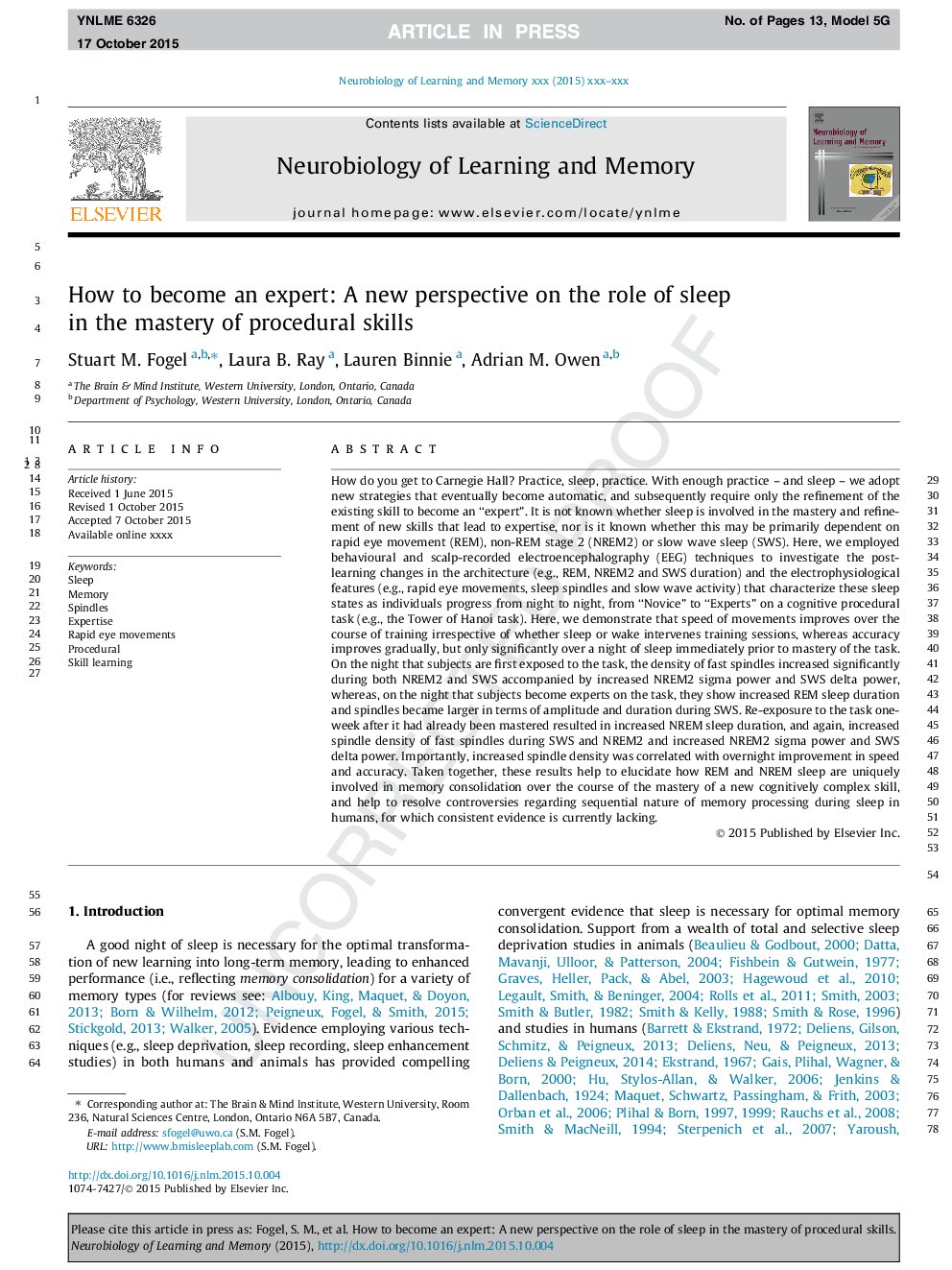| کد مقاله | کد نشریه | سال انتشار | مقاله انگلیسی | نسخه تمام متن |
|---|---|---|---|---|
| 7299382 | 1475150 | 2015 | 13 صفحه PDF | دانلود رایگان |
عنوان انگلیسی مقاله ISI
How to become an expert: A new perspective on the role of sleep in the mastery of procedural skills
ترجمه فارسی عنوان
نحوه تبدیل شدن به یک متخصص: یک نگاه جدید به نقش خواب در تسلط مهارت های رویه ای
دانلود مقاله + سفارش ترجمه
دانلود مقاله ISI انگلیسی
رایگان برای ایرانیان
کلمات کلیدی
خواب حافظه، اسپیندل، تجربه و تخصص، حرکات چشم سریع، رویه ای، یادگیری مهارت،
موضوعات مرتبط
علوم زیستی و بیوفناوری
علم عصب شناسی
علوم اعصاب رفتاری
چکیده انگلیسی
How do you get to Carnegie Hall? Practice, sleep, practice. With enough practice - and sleep - we adopt new strategies that eventually become automatic, and subsequently require only the refinement of the existing skill to become an “expert”. It is not known whether sleep is involved in the mastery and refinement of new skills that lead to expertise, nor is it known whether this may be primarily dependent on rapid eye movement (REM), non-REM stage 2 (NREM2) or slow wave sleep (SWS). Here, we employed behavioural and scalp-recorded electroencephalography (EEG) techniques to investigate the post-learning changes in the architecture (e.g., REM, NREM2 and SWS duration) and the electrophysiological features (e.g., rapid eye movements, sleep spindles and slow wave activity) that characterize these sleep states as individuals progress from night to night, from “Novice” to “Experts” on a cognitive procedural task (e.g., the Tower of Hanoi task). Here, we demonstrate that speed of movements improves over the course of training irrespective of whether sleep or wake intervenes training sessions, whereas accuracy improves gradually, but only significantly over a night of sleep immediately prior to mastery of the task. On the night that subjects are first exposed to the task, the density of fast spindles increased significantly during both NREM2 and SWS accompanied by increased NREM2 sigma power and SWS delta power, whereas, on the night that subjects become experts on the task, they show increased REM sleep duration and spindles became larger in terms of amplitude and duration during SWS. Re-exposure to the task one-week after it had already been mastered resulted in increased NREM sleep duration, and again, increased spindle density of fast spindles during SWS and NREM2 and increased NREM2 sigma power and SWS delta power. Importantly, increased spindle density was correlated with overnight improvement in speed and accuracy. Taken together, these results help to elucidate how REM and NREM sleep are uniquely involved in memory consolidation over the course of the mastery of a new cognitively complex skill, and help to resolve controversies regarding sequential nature of memory processing during sleep in humans, for which consistent evidence is currently lacking.
ناشر
Database: Elsevier - ScienceDirect (ساینس دایرکت)
Journal: Neurobiology of Learning and Memory - Volume 125, November 2015, Pages 236-248
Journal: Neurobiology of Learning and Memory - Volume 125, November 2015, Pages 236-248
نویسندگان
Stuart M. Fogel, Laura B. Ray, Lauren Binnie, Adrian M. Owen,
